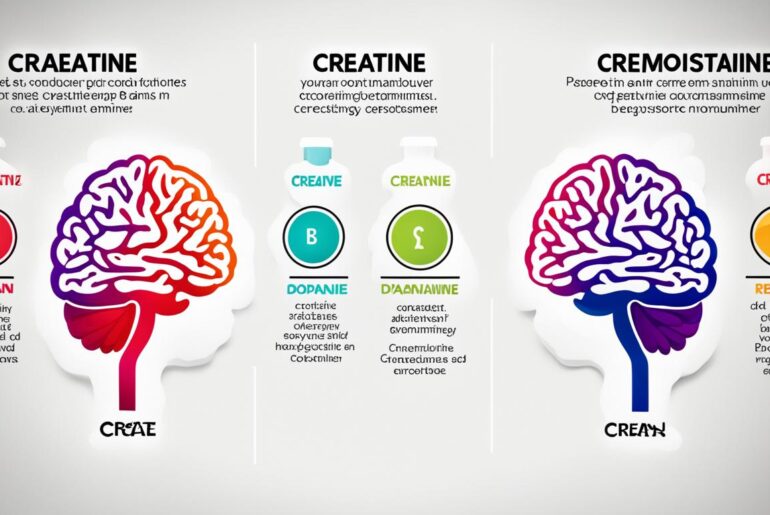Did you know that the human brain utilizes approximately 20% of the body’s total energy, despite making up only about 2% of its weight? This staggering demand for energy underscores the importance of dietary supplements like creatine, which play a vital role in maintaining cognitive function. The quest for optimal timing for creatine intake has captivated the attention of many seeking to boost cognitive performance and enhance mental clarity. My investigation peels back the layers of scientific research to see if we can pinpoint the best times to supplement with creatine to gain effective brain power enhancement.
Key Takeaways
- Understanding when to supplement with creatine could significantly enhance mental clarity and cognitive capabilities.
- Optimal timing for creatine intake is key for those looking to boost cognitive performance effectively.
- Current research often presents varied outcomes, but it opens the door to individualized supplementation strategies.
- Vegetarians might experience better responsiveness in memory tasks with properly timed creatine consumption.
- A rigorous methodology in research allows for exploration into how timed creatine supplementation can be an effective brain power enhancement tool.
- Aligning creatine intake with personal cognitive demands shows promise in optimizing its cognitive benefits.
Understanding Creatine’s Role in Cognitive Function
As I delve into the intricate relationship between creatine and the human mind, it becomes evident that this naturally occurring compound is much more than a simple energy source for the muscles. The role of creatine in maintaining brain health and enhancing cognitive function is increasingly recognized, revealing a complex influence on the workings of our central nervous system. Join me as I explore how creatine synthesis and creatine uptake into the brain contribute to mental acuity and performance.
The Essentials of Creatine in Brain Health
The brain is an energy-intensive organ, demanding a constant supply of ATP to maintain its high level of activity. Here, creatine proves indispensable, playing a pivotal role in ensuring that this demand is met. Through its energy-buffering capacity, creatine supports various functions from sustaining concentration in work to facilitating memory recall in study sessions, thus solidifying its importance in nurturing a healthy and active mind.
How Creatine Influences Cognitive Performance
Turning to cognitive tasks, research indicates that creatine’s impact is particularly pronounced in areas requiring rapid and intensive bursts of brain activity. This effect is rooted in the way creatine enhances brain energy metabolism, providing a quick replenishment of ATP and bolstering neurons’ ability to fire rapidly and efficiently. Whether it’s solving complex puzzles or processing new information, the presence of adequate creatine stores seems to be essential for optimal mental performance.
Creatine Synthesis and Uptake in the Central Nervous System
The synthesis of creatine, a process integral to our discussion, involves the interplay of amino acids such as arginine, glycine, and methionine. This biosynthesis is not just limited to the liver but also occurs in the brain, where it is regulated to meet the organ’s unique demands. A specialized transporter carries creatine across the blood-brain barrier, determining the extent of creatine uptake and availability. This transporter is a gatekeeper of sorts, dictating how well our brains are equipped with the creatine necessary for peak cognitive processes.
It is clear that creatine is more than a supplement; it is a crucial cog in the complex machinery of cognitive health, intricately involved in the energy dynamics of the brain. Overlooking its potential would be to ignore a key ally in the pursuit of mental excellence.
Optimal Creatine Dosage for Enhanced Cognitive Abilities
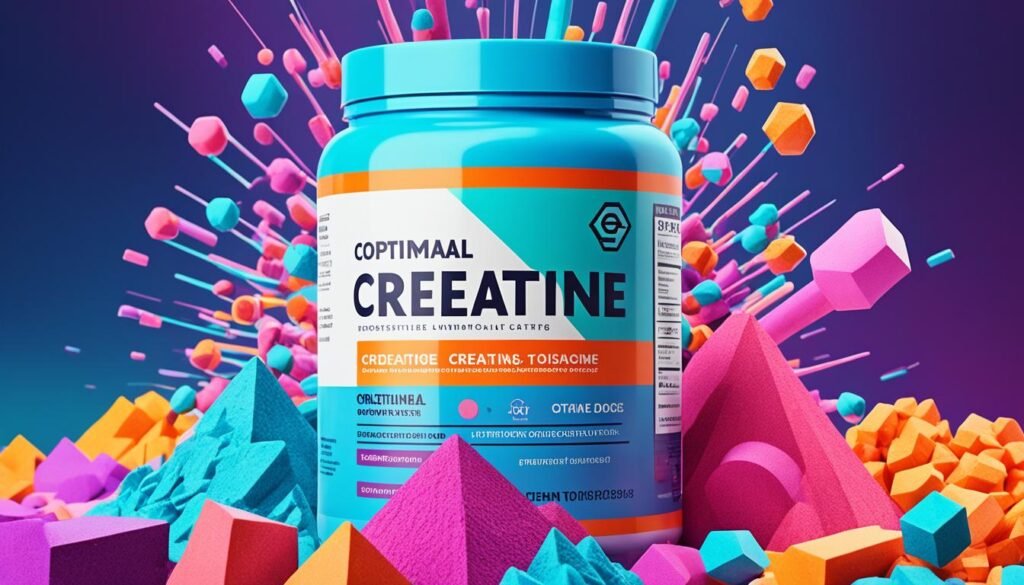
As we delve deeper into the realm of nootropics and cognitive enhancers, creatine has surfaced as a key player in promoting brain health and mental sharpness. Research has shined a spotlight on the optimal creatine dosage necessary for enhanced cognitive abilities, leaving many curious about the optimal amount needed to experience tangible cognitive gains. Let’s explore what scientific inquiry has to say about this remarkable substance.
Recommended Dosages for Cognitive Improvement
One might wonder, how much creatine is sufficient to unlock its brain-enhancing potential? The literature on cognitive improvement suggests a broad spectrum of effective dosages. Clinical trials frequently utilize a loading dose ranging from 5 grams to 20 grams daily for the initial phase, followed by a maintenance dose that varies from subject to subject. An incremental approach to determining individual needs may be prudent in the pursuit of cognitive enhancement without overdoing it.
Correlation of Dosage and Cognitive Gains
Understanding the dosage correlation is pivotal in harnessing creatine’s full potential for cognitive improvement. It’s not merely about increasing the dose, but rather finding a balance that your body can utilize effectively. Some studies indicate that a moderate, consistent intake might support cognitive endurance and resilience, especially under conditions of mental strain or sleep deprivation. This complex dosage correlation requires careful navigation to capitalize on the cognitive benefits without incurring unnecessary risks.
Ultimately, while the quest for the optimal creatine dosage continues, being informed and vigilant about how we supplement is the cornerstone of achieving cognitive improvement and overall brain health.
Best Practices for Timing Creatine Intake
To optimize cognitive performance through supplementation, understanding and implementing effective creatine timing strategies is imperative. My experience suggests that there is more to it than merely consuming the supplement; it involves precise timing to maximize creatine absorption and enhance subsequent creatine utilization in the body.
The Science Behind Creatine Timing Strategies
I delved into the latest scientific literature that suggests a strategic approach to consuming creatine. By favoring specific times for intake, such as post-exercise or with a meal containing carbs and protein, one can potentially heighten creatine’s effects on brain health. This takes advantage of the body’s natural insulin response, which aids in creatine uptake by muscle and brain tissue.
Maximizing Creatine Absorption and Utilization
For anyone seeking to maximize the nootropic effects of creatine, aligning intake with your body’s natural rhythms could be key. While there isn’t a one-size-fits-all approach, following best practices for creatine intake means considering factors such as your digestive cycle and physical activity levels to optimize its cognitive benefits.
- Schedule creatine intake shortly after exercise to harness the spike in insulin sensitivity.
- Combine creatine with a balanced meal to aid in absorption and reduce any potential digestive discomfort.
- Consider the time of day when your cognitive demands are highest—timing your creatine intake accordingly may provide an additional nootropic boost.
Of course, these practices are general guidelines, and individual responses can vary. I believe that with a considered, methodical approach, supplementation can be fine-tuned for maximal cognitive enhancement.
Creatine Supplementation: Immediate versus Sustained Release Forms
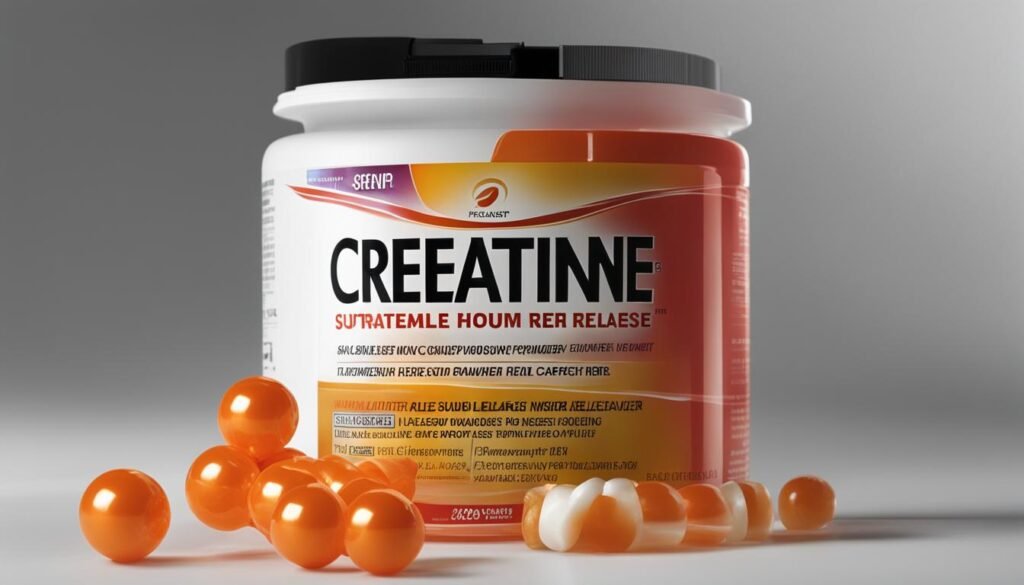
As a journalist fascinated by the evolving landscapes of dietary supplementation, I’ve had the opportunity to delve into the specifics surrounding creatine. In this pursuit, a critical distinction has emerged between the immediate and sustained release forms of creatine supplementation, each providing a unique avenue for cognitive enhancement impact. Let’s explore these creatine supplement forms and their implications for brain health.
Comparing Different Forms of Creatine Supplements
The landscape of creatine supplementation is dotted with various options, but two distinct categories have captured the interest of the health and wellness community—immediate release creatine and sustained release creatine. The former, typified by the well-researched creatine monohydrate, is known for its rapid assimilation and subsequent boost in creatine levels within the plasma and muscle tissue. The latter category includes formulations like creatine ethyl ester, designed to provide a gradual release and potentially stabilize creatine levels over a more extended period.
The ongoing debate begs an analysis; thus, I’ve prepared a table highlighting various attributes and distinguishing these two forms:
| Characteristic | Immediate Release Creatine | Sustained Release Creatine |
|---|---|---|
| Absorption Rate | Quick, peaks shortly after intake | Slower, designed to release over time |
| Popular Form | Creatine Monohydrate | Creatine Ethyl Ester |
| Usage Context | Pre/Post workouts and specific cognitive tasks | Throughout the day to maintain levels |
| Research Backing | Extensive clinical studies supporting efficacy | Emerging research, requires further analysis |
| Potential for Cognitive Enhancement | Well-documented, especially in tasks requiring immediate cognitive boost | Potential benefits for sustained cognitive demands over longer periods |
The Impact of Supplement Form on Cognitive Enhancement
When considering the cognitive enhancement impact of creatine supplementation, the choice between immediate and sustained release forms is not merely a matter of preference but one of functionality and intended use. While the immediate release variants like creatine monohydrate might be better suited for acute cognitive demands, sustained release options could offer a more consistent cognitive enhancement over time. The difference in absorption kinetics means individuals seeking targeted cognitive support may find one form more beneficial than the other.
In conclusion, my journey into the details of creatine supplement forms has revealed a fascinating spectrum of choice for consumers seeking cognitive enhancement. Whether opting for the swift action of immediate release creatine or the enduring presence of sustained release creatine, understanding these dynamics is crucial in navigating the world of brain health supplementation.
The Relationship Between Exercise, Creatine, and Cognitive Enhancement
Delving into the dynamic synergy between exercise and creatine supplementation unveils a promising strategy for bolstering cognitive function. The fusion of physical exertion with creatine intake has sparked considerable interest within the fitness and wellness realms, especially considering the potential cognitive advantages that this combination might yield. Here, we explore how this relationship is a cornerstone for not just physical, but also mental enhancement.
Synergy Between Physical Activity and Creatine Intake
The exercise and creatine relationship is rooted in the idea that when combined, these elements work in concert to amplify each other’s benefits. Creatine, a well-known ergogenic aid typically associated with physical performance, also has remarkable implications for cognitive health. By adding regular exercise into the equation, we witness a heightened level of synergy in physical activity that promises to advance our overall brain function.
Exercising the Mind and Body for Enhanced Brain Power
While understanding physical fitness’s impact on our muscles is straightforward, discerning its effects on our cognitive capabilities requires a deeper look. It is here that creatine intake plays a pivotal role. The enhanced brain power achieved through this symbiotic relationship suggests a holistic approach to health and fitness—one where mental sharpness is just as attainable as physical strength.
In my assessment, the combined effects of targeted physical training and strategic creatine supplementation represent a comprehensive regimen designed to improve not only muscular endurance but also mental stamina and processing speed. This integrative view has sparked my curiosity and drives me to delve further into how we can optimize cognitive and physiological functions simultaneously.
- Resistance training paired with creatine boosts muscle and brain performance.
- Studies indicate a potential uplift in cognitive benefits, linked to regular physical and mental exercise.
- Maintaining a balanced exercise routine with appropriate creatine intake may lead to enhanced mental clarity and focus.
Timing Creatine Intake for Cognitive Enhancement
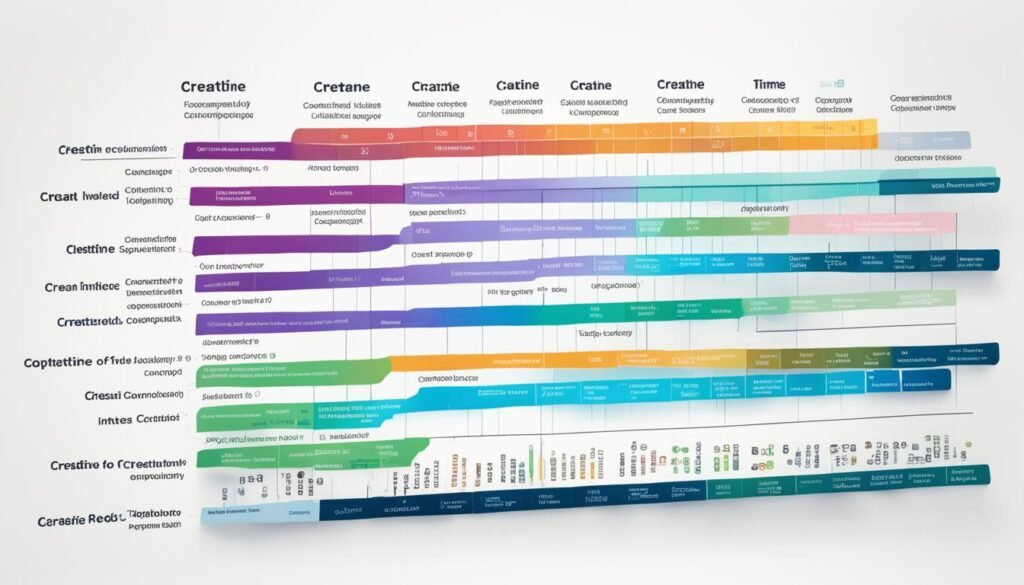
In the quest to harness the full potential of creatine for cognitive enhancement, one critical factor emerges as a common thread: the optimization of the creatine consumption schedule. Personalized to individual lifestyles and cognitive demands, this schedule can be a determinant of the success in achieving heightened mental performance. On that note, let’s delve into the strategic timing of creatine intake to align with the body’s natural rhythms and mental exigencies.
The Ideal Schedule for Consuming Creatine
To maximize the cognitive benefits of creatine, it’s essential to consider a consumption timeline that dovetails with one’s daily mental peaks and valleys. For instance, those seeking timing for cognitive enhancement may find morning consumption advantageous, fueling their system ahead of a day filled with intense mental activity. Similarly, aligning creatine intake with the unique cognitive patterns of various professions could potentially yield improved concentration and focus during the most demanding parts of the day.
Aligning Creatine Intake with Cognitive Demands
Considering different lifestyle patterns and cognitive profiles, aligning creatine intake with periods of heightened cognitive demands could be beneficial. A consistent creatine consumption schedule, when coordinated with tasks that require acute mental focus, may contribute to improved brain function and cognitive resilience. For instance, students during exam periods or professionals working on complex projects may experience enhanced mental clarity and memory recall with properly timed supplementation.
Notably, vegetarians, typically with lower baseline creatine levels due to their diet, might particularly benefit from scheduling creatine supplementation to align with cognitive tasks, effectively bridging the dietary gap and maximizing cognitive outcomes.
The Neuroprotective Effects of Creatine on Brain Health
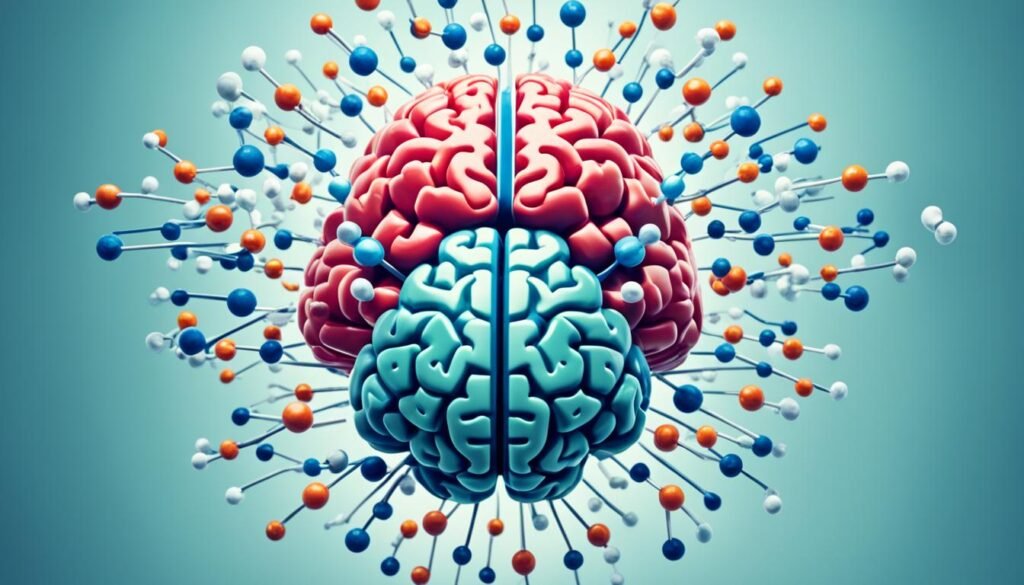
As we delve deeper into the capabilities of creatine, it’s not merely its impact on cognitive performance that captures our attention, but also its neuroprotective effects. These are particularly relevant for promoting brain health, enhancing neuronal plasticity, and potentially aiding in dementia prevention.
Creatine’s Role in Neuroprotection and Neuronal Plasticity
My exploration into the realm of creatine’s influence on the brain uncovers its critical role in safeguarding neurons against damage. This protective ability is linked to creatine’s energy-regulating function, which could help maintain the vitality of brain cells. The adaptability of our neural pathways, or neuronal plasticity, is vital for learning and memory. It appears that creatine supplementation might enhance this plasticity, offering a remarkable edge in the preservation and optimization of cognitive functions.
Impact on Age-Related Cognitive Decline and Dementia Prevention
In the fight against age-related cognitive decline, creatine shows promise as a significant ally. With the potential to slow the progression of cognitive deterioration, it emerges as a beacon of hope for those concerned with maintaining mental acuity into older age. There is an ongoing conversation about creatine serving as an important piece in the puzzle of dementia prevention. This potential stems from observed correlations between high resting creatine levels and improved cognitive performance, particularly in memory recognition tasks meaningful for our aging population.
Responding to Skepticism: Creatine and Placebo Effects
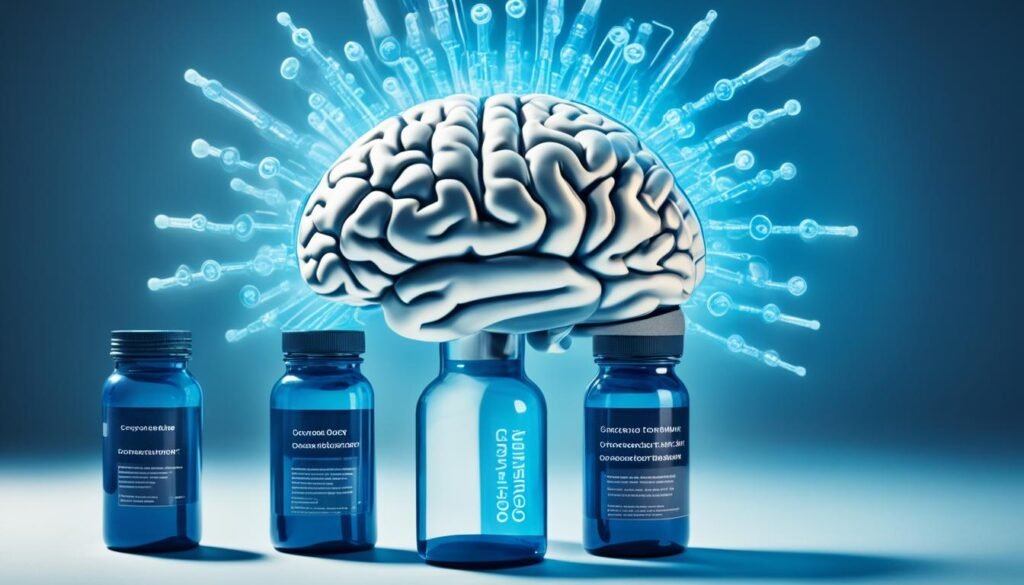
As I delve into the realm of creatine supplementation, my focus sharpens on the interplay between creatine skepticism and placebo effects. It’s imperative to clear the fog that shrouds myths about creatine and the misconceptions that often undermine its legitimate role in cognitive enhancement. Today, we maintain our commitment to uncovering evidence-based claims and dispelling doubts, reinforcing creatine’s potential to deliver significant cognitive benefits.
Addressing Myths and Misconceptions About Creatine
I encounter a myriad of fallacies surrounding creatine’s effects, leading many to question its efficacy. Claims of creatine’s cognitive contributions may seem overstated to some critics, who are quick to challenge its potential to enhance memory or reasoning faculties. Here, it’s my role to navigate these waters, to separate anecdotal skepticism from scientific scrutiny, ensuring informed dialogues around supplementation.
Evidence-Based Claims of Creatine’s Cognitive Benefits
Within the domain of evidence-based research, placebo-controlled studies serve as the gold standard in validating creatine’s cognitive prowess. In such research designs, the discernment between actual benefits and placebo-induced improvements becomes clearer. This rigorous approach to study design strengthens the foundation upon which we rest our claims regarding creatine, thereby elevating our discussion to one grounded in science and fact.
Placebo-controlled experimentation is key to understanding the true impact of creatine on cognitive function, as it provides a measurable difference between perceived and actual cognitive advancements.
| Study Description | Creatine Supplementation | Placebo | Cognitive Benefits Observed |
|---|---|---|---|
| Memory Assessment | Yes | No | Improved Performance in Memory Tasks |
| Reasoning Skills Analysis | Yes | No | Enhanced Logical and Critical Thinking |
| Long-Term Cognitive Health | Yes | No | Potential Role in Neuroprotection |
| Energy and Focus | Yes | No | Increased Mental Alertness and Sustained Attention |
In this truth-seeking journey of ours, as we unfold the layers of creativity myths and bring to light the empirical support for its cognitive effects, we become more empowered as consumers and as advocates for brain health. Let the conversation continue, with careful analysis and a critical eye ever directed towards the continuous stream of research that shapes our collective understanding.
Special Populations: Creatine’s Cognitive Effects in Vegetarians
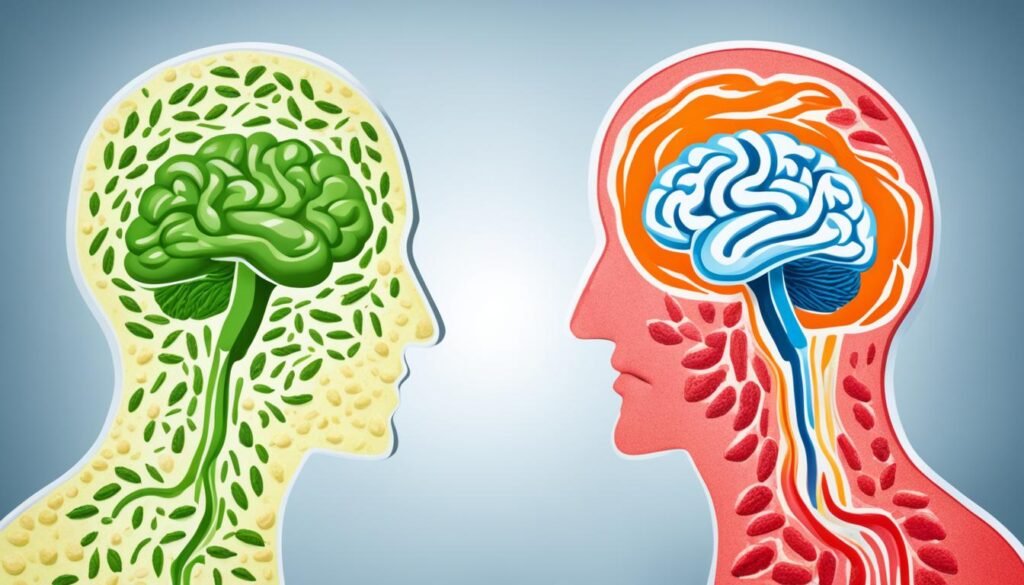
My exploration into the world of dietary supplementation reveals a fascinating nuance when considering the vegetarian diet. It’s a common understanding that vegetarians often experience a lack of animal protein in their nutrition, which can lead to a deficiency in certain nutrients, including creatine. Given this backdrop, the use of creatine supplements could play a vital role in augmenting cognitive functions in these individuals.
Enhanced Responsiveness in Vegetarians
In analyzing the creatine effects in vegetarians, what stands out is the pronounced level of cognitive enhancement. Such enhanced responsiveness to creatine supplementation is particularly evident in memory-based tasks. This could be attributed to the natural scarcity of creatine in a vegetarian diet, leading to a more pronounced impact when this key nutrient is introduced into the body.
Creatine Intake in Diets Lacking Animal Protein
When we consider vegetarianism, we must confront the reality of a diet lacking animal protein and consequently, its implications on cognitive health. It is my observation that strategic creatine supplementation is more than a mere compensatory measure; it may present a unique opportunity for cognitive enhancement that might not be as significant in non-vegetarians.
| Cognitive Task | Response in Vegetarians | Response in Non-Vegetarians |
|---|---|---|
| Short-term Memory | Significantly Improved | Modest Improvement |
| Reasoning | Moderately Improved | Mild Improvement |
| Processing Speed | Some Improvement | Little to No Improvement |
The data underlines a clear pattern: the amplified effect of creatine on cognitive performance in vegetarians. By acknowledging and leveraging this enhanced responsiveness, I advocate for personalized creatine regimens that could bring cognitive benefits to vegetarians, beyond what their diet alone can offer.
Monitoring and Assessing Cognitive Enhancements with Creatine
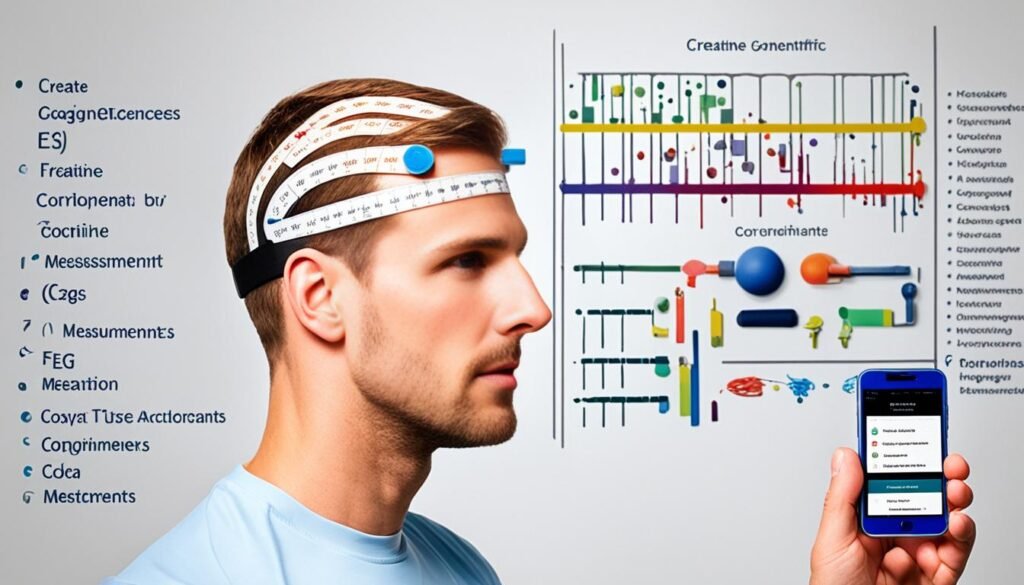
As an advocate for mental fitness, I recognize the significance of monitoring cognitive enhancements to ensure the efficacy of supplements like creatine. Rigorous creatine evaluation is essential to discern its true potential in boosting brain performance. With an array of standardized cognitive tests at my disposal, I aim to provide clear and precise quantitative measures for the impact of creatine on cognitive function.
Evaluating Cognitive Gains Through Standardized Tests
Employing various standardized tests is pivotal in assessing the role creatine may play in enhancing cognition. These tests enable a methodical approach to cognitive function evaluation, encompassing memory capacity, attention span, and executive processes. To ensure reliable outcomes, I take advantage of randomized controlled trials, a cornerstone in clinical research, as they provide a sturdy framework for delineating the cognitive gains facilitated by creatine supplementation.
Quantitative Measures of Creatine’s Impact on Cognitive Function
I incorporate quantitative analyses to measure and interpret the cognitive advantages potentially afforded by creatine. Through well-designed experimental trials and statistical scrutiny, I elucidate the nuances of creatine’s influence on mental faculties. This data-driven approach informs and guides best application practices and supports the ongoing quest to optimize cognitive health strategies.
| Cognitive Domain | Type of Measurement | Impact of Creatine (General Findings) |
|---|---|---|
| Memory | Recall Tests | Improvement in both immediate and delayed memory performance |
| Attention | Continuous Performance Tasks | Enhanced focus and reduced lapses of attention |
| Executive Function | Puzzle-Solving Assessments | Better problem-solving abilities and planning skills |
| Response Inhibition | Stroop Tests | Increased ability to control impulsive responses |
Conclusion
In reflecting upon the journey through the realms of advanced supplementation and cognitive function, I’ve delved into the nuanced web of synergy between timed creatine intake and the pursuit of cognitive enhancement. The scientific tapestry weaves a narrative of moderate optimism, where the meticulous timing of creatine administration might indeed be the key to unlocking heightened cognitive faculties. Summing up the cognitive benefits gleaned from current research, it becomes clear that elements like memory agility, sharpened intelligence, and refined reasoning skills stand to gain from well-scheduled creatine consumption, with vegetarians possibly at the forefront of this fascinating biochemical phenomenon.
Summarizing the Cognitive Benefits of Timed Creatine Intake
As I dissect the voluminous data, the anecdotal reports, and the clinical studies, a certain pattern emerges. Timed creatine intake, while still shrouded in debates and curiosity, has marked its territory in the domain of mental acuity. Bespoke strategies, tailored to individual needs and lifestyles, may well underscore a future where supplemental creatine consistently fortifies our mental armamentarium. Nonetheless, my in-depth scrutiny confirms that the full magnitude of these cognitive enhancements remains a canvas ripe for further empirical painting.
Future Directions in Creatine Research for Cognitive Enhancement
Peering into the looking glass of creatine research, I envisage future directions that hold promise for transformative discoveries. Larger cohorts, eclectic population studies, and a laser focus on precise timing and optimal dosing are the cornerstones upon which the next chapter of cognitive enhancement research will be built. With each step forward, my commitment to unveiling the truths about creatine persists, fueled by a relentless quest for knowledge and an unwavering dedication to pushing the boundaries of what is possible for the human mind.
FAQ
What is the optimal timing for creatine intake to boost cognitive performance?
While the precise optimal timing for maximum absorption and cognitive benefit is still under investigation, it’s generally recommended to take creatine in alignment with periods of increased cognitive demands, such as before mentally challenging tasks or during sleep deprivation. Timing may also be adjusted based on individual needs and lifestyles, such as for vegetarians who might experience enhanced cognitive benefits from supplementation.
How does creatine influence cognitive function and brain health?
Creatine plays a crucial role in maintaining energy supply for brain function under high-demand contexts, supports neuronal plasticity, and has been shown to influence cognitive performance. Its ability to sustain ATP levels, essential for the brain’s high energy consumption, is central to its impact on cognitive functions, particularly in tasks involving memory and intelligence.
What are the recommended dosages of creatine for cognitive improvement?
Clinical studies vary widely in the dosages administered, ranging from a high of 20 grams per day to more modest dosages related to body weight (e.g., 0.03 grams/kg). While short-term higher doses can significantly increase brain creatine stores, the exact relationship between dosage and cognitive improvement requires further research. Nonetheless, some studies suggest a dosage-dependent relationship with cognitive benefits.
How can creatine absorption and utilization be maximized for cognitive enhancement?
To maximize creatine’s cognitive benefits, absorption and utilization may be enhanced by timing intake in relation to both dietary factors and individual metabolic states. For instance, taking creatine with a meal that includes carbohydrates and protein can improve absorption. More research is needed to define the best practices for timing creatine intake for cognitive enhancement.
What is the difference between immediate and sustained release forms of creatine supplements?
Immediate release forms, like creatine monohydrate, rapidly increase plasma creatine levels and are well-studied for effectiveness. Sustained release forms, such as creatine ethyl ester, have different absorption and utilization kinetics. Research comparing these forms is ongoing, but more is needed to determine their specific impacts on cognitive enhancement.
Can exercise enhance the cognitive benefits of creatine supplementation?
Yes, the combination of physical activity and creatine supplementation shows promise for enhancing cognitive abilities. This synergy, especially with resistance training, may improve muscle performance and potentially offer cognitive benefits. A holistic regimen that includes both may optimize cognitive function and brain power.
How does creatine intake impact neuroprotection and brain health?
Creatine exhibits neuroprotective properties, with the potential to benefit neuronal plasticity, reduce age-related cognitive decline, and possibly prevent dementia. Higher resting levels of creatine in the brain, achieved through supplementation, have been linked to improved cognitive performance, including memory tasks.
How are cognitive enhancements from creatine supplementation monitored and assessed?
Cognitive enhancements are monitored and assessed through randomized controlled trials utilizing standardized cognitive tests and quantitative measures. These assessments range from memory and attention tests to executive function evaluations and are essential for quantifying creatine’s impact and substantiating claims about its cognitive benefits.
Why are vegetarians particularly responsive to creatine supplementation for cognitive improvement?
Vegetarians, who typically consume less creatine in their diets due to the lack of animal proteins, have shown enhanced responsiveness to creatine supplementation, especially in memory tasks. Supplementation helps to address potential creatine deficiencies and maximize cognitive performance among this demographic.
What are the common myths and misconceptions about creatine, and how does clinical evidence address them?
Common misconceptions include unfounded fears about the safety and efficacy of creatine supplementation. Clinical evidence, particularly from placebo-controlled studies, supports creatine’s positive impact on cognitive abilities, helping to dispel these myths and validate creatine’s role in cognitive enhancement.


